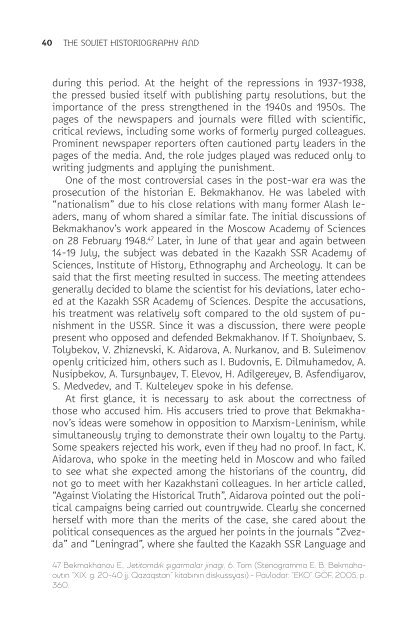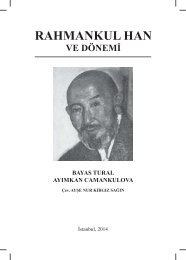THE SOVIET HISTORIOGRAPHY AND THE QUESTION OF KAZAKHSTAN’S HISTORY
SOVYET-TARIH-YAZICILIGI-ENG
SOVYET-TARIH-YAZICILIGI-ENG
You also want an ePaper? Increase the reach of your titles
YUMPU automatically turns print PDFs into web optimized ePapers that Google loves.
40<br />
<strong>THE</strong> <strong>SOVIET</strong> <strong>HISTORIOGRAPHY</strong> <strong>AND</strong><br />
during this period. At the height of the repressions in 1937-1938,<br />
the pressed busied itself with publishing party resolutions, but the<br />
importance of the press strengthened in the 1940s and 1950s. The<br />
pages of the newspapers and journals were filled with scientific,<br />
critical reviews, including some works of formerly purged colleagues.<br />
Prominent newspaper reporters often cautioned party leaders in the<br />
pages of the media. And, the role judges played was reduced only to<br />
writing judgments and applying the punishment.<br />
One of the most controversial cases in the post-war era was the<br />
prosecution of the historian E. Bekmakhanov. He was labeled with<br />
“nationalism” due to his close relations with many former Alash leaders,<br />
many of whom shared a similar fate. The initial discussions of<br />
Bekmakhanov’s work appeared in the Moscow Academy of Sciences<br />
on 28 February 1948. 47 Later, in June of that year and again between<br />
14-19 July, the subject was debated in the Kazakh SSR Academy of<br />
Sciences, Institute of History, Ethnography and Archeology. It can be<br />
said that the first meeting resulted in success. The meeting attendees<br />
generally decided to blame the scientist for his deviations, later echoed<br />
at the Kazakh SSR Academy of Sciences. Despite the accusations,<br />
his treatment was relatively soft compared to the old system of punishment<br />
in the USSR. Since it was a discussion, there were people<br />
present who opposed and defended Bekmakhanov. If T. Shoiynbaev, S.<br />
Tolybekov, V. Zhiznevski, K. Aidarova, A. Nurkanov, and B. Suleimenov<br />
openly criticized him, others such as I. Budovnis, E. Dilmuhamedov, A.<br />
Nusipbekov, A. Tursynbayev, T. Elevov, H. Adilgereyev, B. Asfendiyarov,<br />
S. Medvedev, and T. Kulteleyev spoke in his defense.<br />
At first glance, it is necessary to ask about the correctness of<br />
those who accused him. His accusers tried to prove that Bekmakhanov’s<br />
ideas were somehow in opposition to Marxism-Leninism, while<br />
simultaneously trying to demonstrate their own loyalty to the Party.<br />
Some speakers rejected his work, even if they had no proof. In fact, K.<br />
Aidarova, who spoke in the meeting held in Moscow and who failed<br />
to see what she expected among the historians of the country, did<br />
not go to meet with her Kazakhstani colleagues. In her article called,<br />
“Against Violating the Historical Truth”, Aidarova pointed out the political<br />
campaigns being carried out countrywide. Clearly she concerned<br />
herself with more than the merits of the case, she cared about the<br />
political consequences as the argued her points in the journals “Zvezda”<br />
and “Leningrad”, where she faulted the Kazakh SSR Language and<br />
47 Bekmakhanov E., Jetitomdık şıgarmalar jinagı, 6. Tom (Stenogramma E. B. Bekmahaovtın<br />
“XIX. g. 20-40 jj. Qazaqstan” kitabının diskussyası).- Pavlodar: “EKO” GÖF, 2005, p.<br />
360.



